Abstract
Results of 100 cortical resections for 76 temporal, 23 frontal and one parietal lobe epilepsies were studied in terms of seizure relief and overall benefit. A non-homogenous Markov chain model was used to take into account both the intravariability of post-surgical outcome and the differences in duration of follow-up in a group of patients consecutively operated. The seizure free (SF) state was defined as no seizure in the previous five months at first follow up visit and none in the preceding 12 months at subsequent annual visits. For the whole of the population the SF probability was 82%, 66%, 61%, and 62% at six months, one year, two and five years respectively. A better outcome was found for temporal lobe epilepsy (SF probability: 68% at the fifth postoperative year) than for frontal lobe epilepsy (SF probability: 42% at the fifth postoperative year) with a statistically significant difference. Pre- and postoperative interictal signs and symptoms were classified according to their clinical significance: (a) mild handicap--symptoms recognisable but no interference with usual life, and (b) moderate or severe handicap--interference with some or all daily activities. The interictal state was considered more impaired after surgery than before in two situations: (a) either symptoms, absent before surgery, appeared in the postoperative period involving a moderate or severe handicap, or (b) symptoms present before surgery and answerable for a mild or moderate handicap that increased to involve a moderate or severe handicap respectively in the postoperative period. Surgery was considered a major benefit when two conditions were fulfilled-namely, a SF state and no deterioration of the interictal stage when compared with the preoperative period. The probability of obtaining such a benefit was 58%, 51%, 48% and 56% at six months, one year, two and five years respectively. The results suggest that surgery is an effective treatment for more than 50% of long lasting medically intractable epilepsies.
Full text
PDF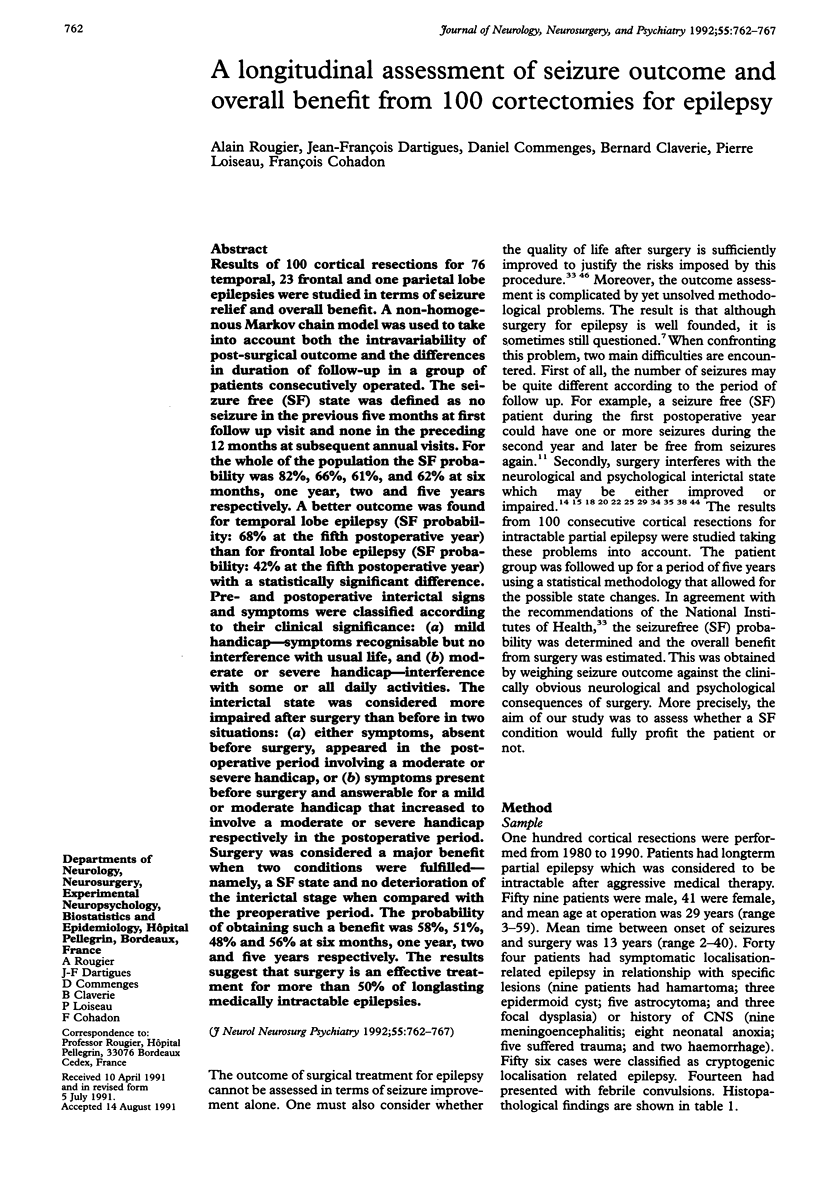
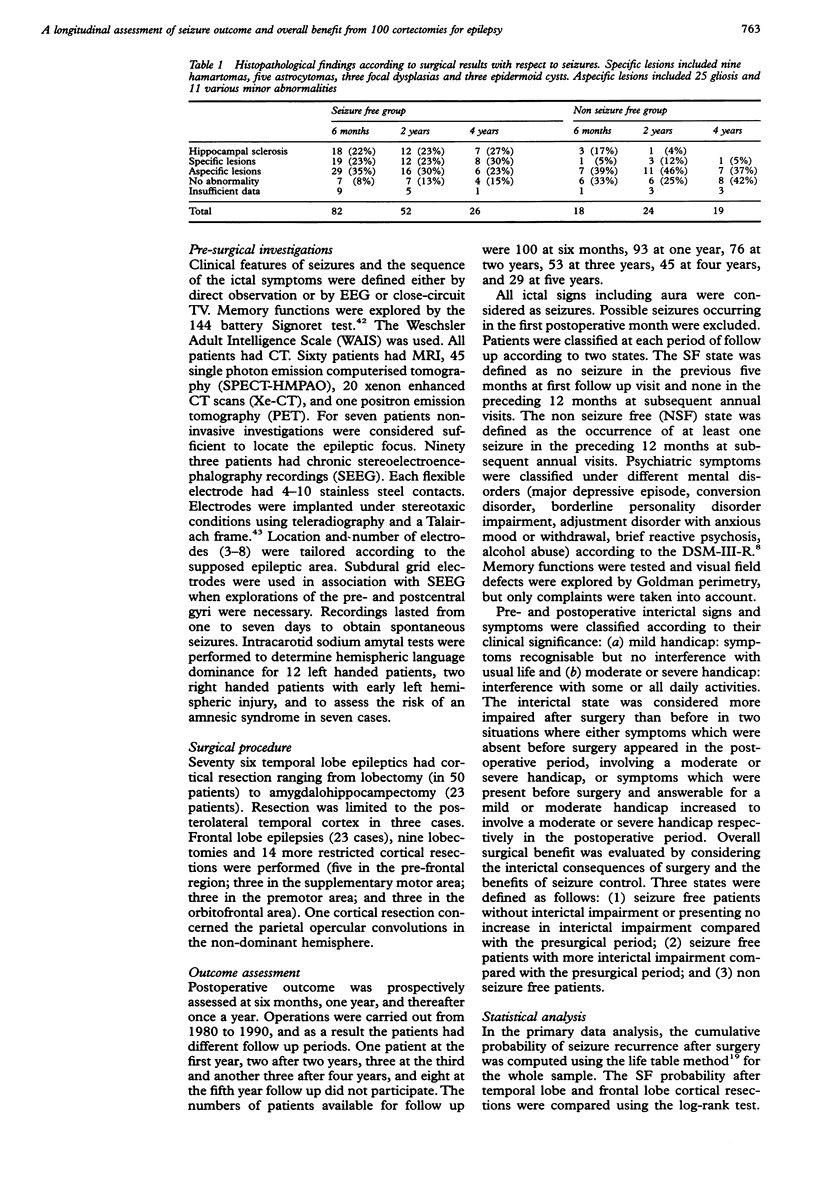
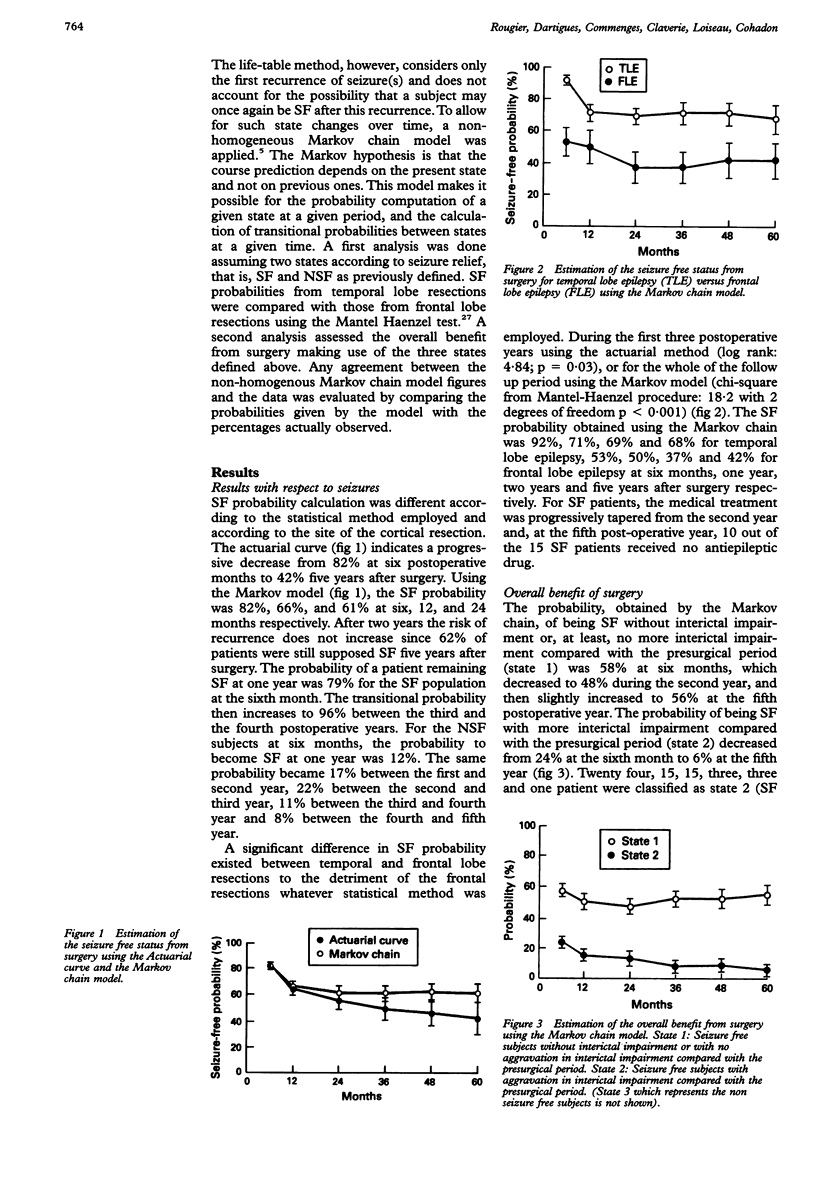
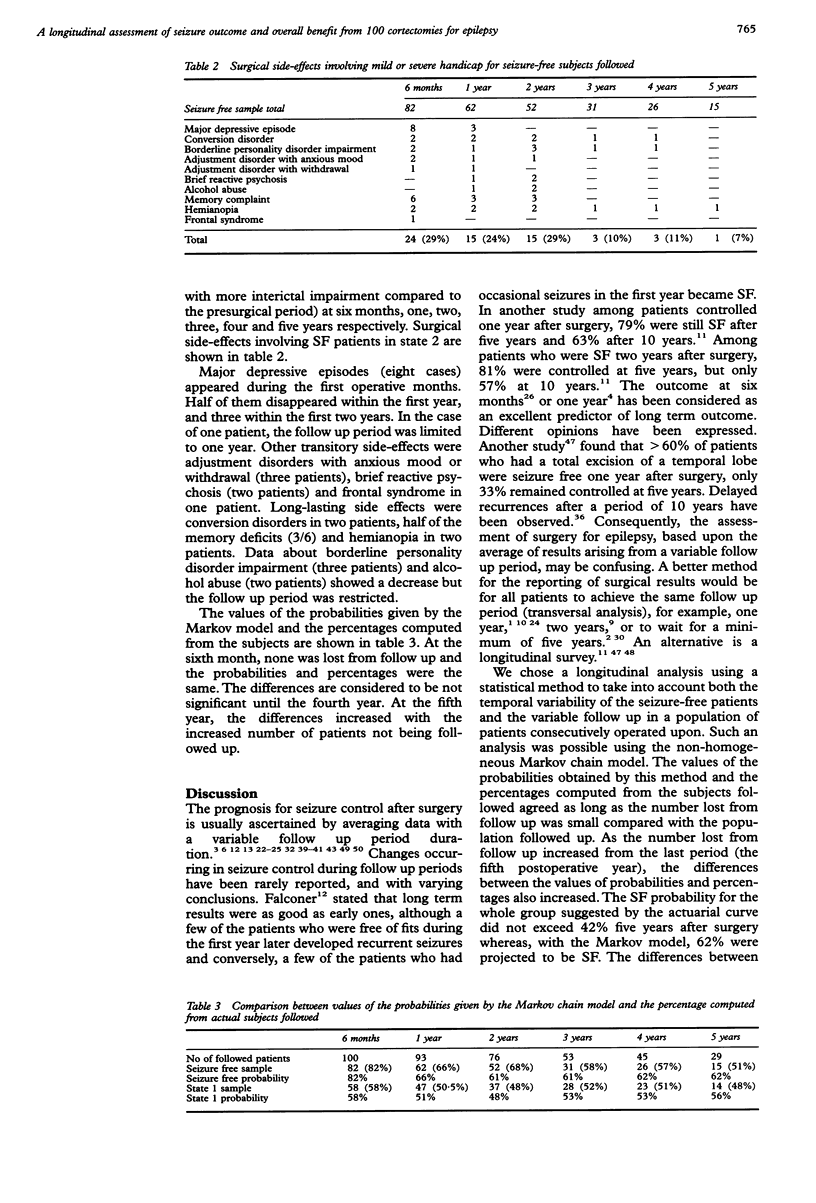
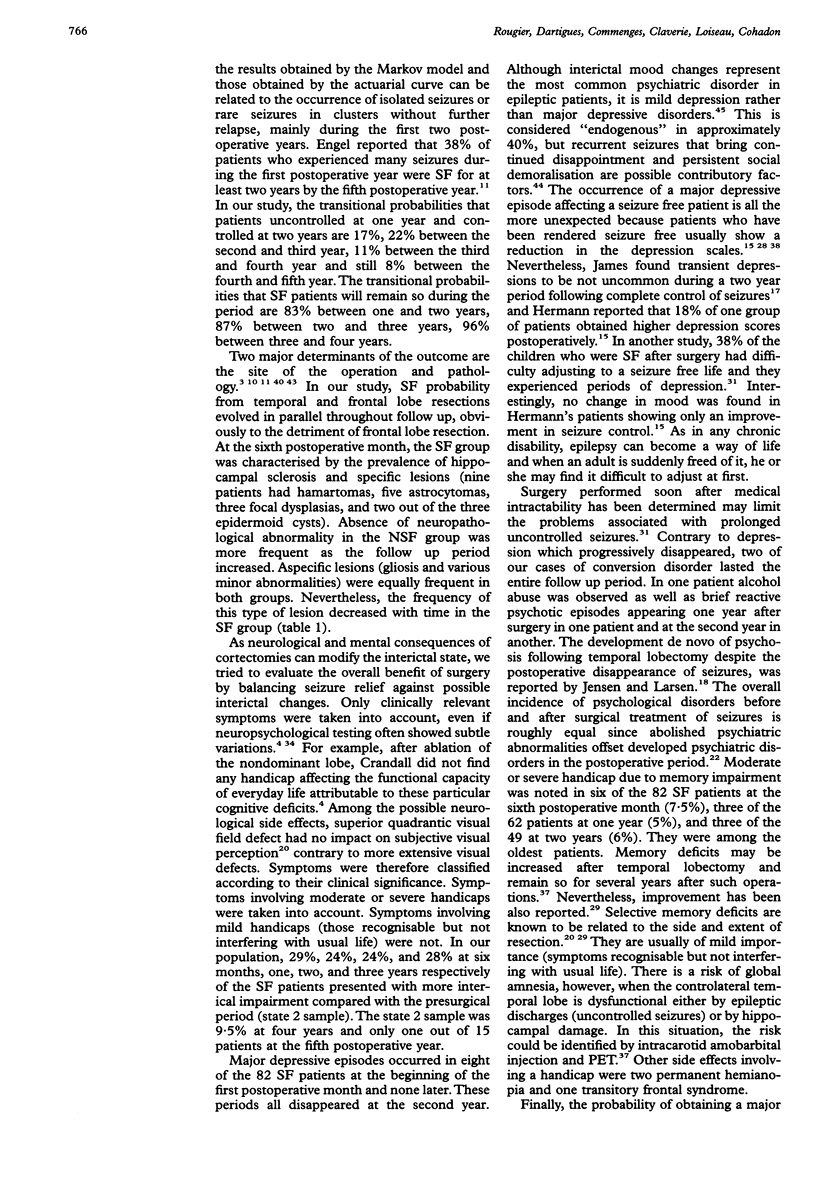
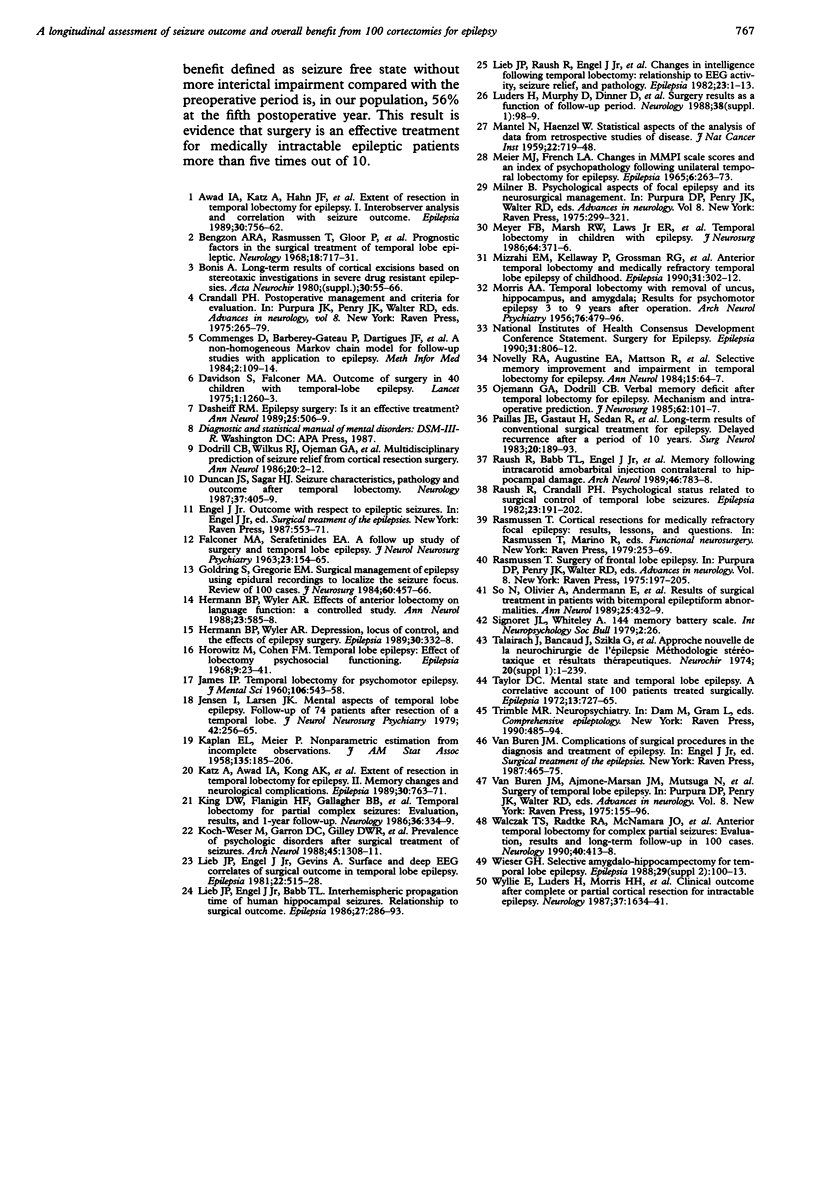
Selected References
These references are in PubMed. This may not be the complete list of references from this article.
- Awad I. A., Katz A., Hahn J. F., Kong A. K., Ahl J., Lüders H. Extent of resection in temporal lobectomy for epilepsy. I. Interobserver analysis and correlation with seizure outcome. Epilepsia. 1989 Nov-Dec;30(6):756–762. doi: 10.1111/j.1528-1157.1989.tb05335.x. [DOI] [PubMed] [Google Scholar]
- Bengzon A. R., Rasmussen T., Gloor P., Dussault J., Stephens M. Prognostic factors in the surgical treatment of temporal lobe epileptics. Neurology. 1968 Aug;18(8):717–731. doi: 10.1212/wnl.18.8.717. [DOI] [PubMed] [Google Scholar]
- Bonis A. Long term results of cortical excisions based on stereotactic investigations in severe, drug resistant epilepsies. Acta Neurochir Suppl (Wien) 1980;30:55–66. doi: 10.1007/978-3-7091-8592-6_6. [DOI] [PubMed] [Google Scholar]
- Commenges D., Barberger-Gateau P., Dartigues J. F., Loiseau P., Salamon R. A non-homogeneous Markov chain model for follow-up studies with application to epilepsy. Methods Inf Med. 1984 Apr;23(2):109–114. [PubMed] [Google Scholar]
- Dasheiff R. M. Epilepsy surgery: is it an effective treatment? Ann Neurol. 1989 May;25(5):506–510. doi: 10.1002/ana.410250515. [DOI] [PubMed] [Google Scholar]
- Davidson S., Falconer M. A. Outcome of surgery in 40 children with temporal-lobe epilepsy. Lancet. 1975 Jun 7;1(7919):1260–1263. doi: 10.1016/s0140-6736(75)92549-0. [DOI] [PubMed] [Google Scholar]
- Dodrill C. B., Wilkus R. J., Ojemann G. A., Ward A. A., Wyler A. R., van Belle G., Tamas L. Multidisciplinary prediction of seizure relief from cortical resection surgery. Ann Neurol. 1986 Jul;20(1):2–12. doi: 10.1002/ana.410200103. [DOI] [PubMed] [Google Scholar]
- Duncan J. S., Sagar H. J. Seizure characteristics, pathology, and outcome after temporal lobectomy. Neurology. 1987 Mar;37(3):405–409. doi: 10.1212/wnl.37.3.405. [DOI] [PubMed] [Google Scholar]
- Goldring S., Gregorie E. M. Surgical management of epilepsy using epidural recordings to localize the seizure focus. Review of 100 cases. J Neurosurg. 1984 Mar;60(3):457–466. doi: 10.3171/jns.1984.60.3.0457. [DOI] [PubMed] [Google Scholar]
- Hermann B. P., Wyler A. R. Depression, locus of control, and the effects of epilepsy surgery. Epilepsia. 1989 May-Jun;30(3):332–338. doi: 10.1111/j.1528-1157.1989.tb05306.x. [DOI] [PubMed] [Google Scholar]
- Hermann B. P., Wyler A. R. Effects of anterior temporal lobectomy on language function: a controlled study. Ann Neurol. 1988 Jun;23(6):585–588. doi: 10.1002/ana.410230610. [DOI] [PubMed] [Google Scholar]
- Horowitz M. J., Cohen F. M. Temporal lobe epilepsy: effect of lobectomy on psychosocial functioning. Epilepsia. 1968 Mar;9(1):23–41. doi: 10.1111/j.1528-1157.1968.tb04955.x. [DOI] [PubMed] [Google Scholar]
- JAMES I. P. Temporal lobectomy for psychomotor epilepsy. J Ment Sci. 1960 Apr;106:543–558. doi: 10.1192/bjp.106.443.543. [DOI] [PubMed] [Google Scholar]
- Jensen I., Larsen J. K. Mental aspects of temporal lobe epilepsy. Follow-up of 74 patients after resection of a temporal lobe. J Neurol Neurosurg Psychiatry. 1979 Mar;42(3):256–265. doi: 10.1136/jnnp.42.3.256. [DOI] [PMC free article] [PubMed] [Google Scholar]
- Katz A., Awad I. A., Kong A. K., Chelune G. J., Naugle R. I., Wyllie E., Beauchamp G., Lüders H. Extent of resection in temporal lobectomy for epilepsy. II. Memory changes and neurologic complications. Epilepsia. 1989 Nov-Dec;30(6):763–771. doi: 10.1111/j.1528-1157.1989.tb05336.x. [DOI] [PubMed] [Google Scholar]
- King D. W., Flanigin H. F., Gallagher B. B., So E. L., Murvin A. J., Smith D. B., Oommen K. J., Feldman D. S., Power J. Temporal lobectomy for partial complex seizures: evaluation, results, and 1-year follow-up. Neurology. 1986 Mar;36(3):334–339. doi: 10.1212/wnl.36.3.334. [DOI] [PubMed] [Google Scholar]
- Koch-Weser M., Garron D. C., Gilley D. W., Bergen D., Bleck T. P., Morrell F., Ristanovic R., Whisler W. W., Jr Prevalence of psychologic disorders after surgical treatment of seizures. Arch Neurol. 1988 Dec;45(12):1308–1311. doi: 10.1001/archneur.1988.00520360026006. [DOI] [PubMed] [Google Scholar]
- Lieb J. P., Engel J., Jr, Babb T. L. Interhemispheric propagation time of human hippocampal seizures. I. Relationship to surgical outcome. Epilepsia. 1986 May-Jun;27(3):286–293. doi: 10.1111/j.1528-1157.1986.tb03541.x. [DOI] [PubMed] [Google Scholar]
- Lieb J. P., Engel J., Jr, Gevins A., Crandal P. H. Surface and deep EEG correlates of surgical outcome in temporal lobe epilepsy. Epilepsia. 1981 Oct;22(5):515–538. doi: 10.1111/j.1528-1157.1981.tb04124.x. [DOI] [PubMed] [Google Scholar]
- Lieb J. P., Rausch R., Engel J., Jr, Brown W. J., Crandall P. H. Changes in intelligence following temporal lobectomy: relationship to EEG activity, seizure relief, and pathology. Epilepsia. 1982 Feb;23(1):1–13. doi: 10.1111/j.1528-1157.1982.tb05046.x. [DOI] [PubMed] [Google Scholar]
- MANTEL N., HAENSZEL W. Statistical aspects of the analysis of data from retrospective studies of disease. J Natl Cancer Inst. 1959 Apr;22(4):719–748. [PubMed] [Google Scholar]
- MORRIS A. A. Temporal lobectomy with removal of uncus, hippocampus, and amygdala; results for psychomotor epilepsy three to nine years after operation. AMA Arch Neurol Psychiatry. 1956 Nov;76(5):479–496. doi: 10.1001/archneurpsyc.1956.02330290023003. [DOI] [PubMed] [Google Scholar]
- Meier M. J., French L. A. Changes in MMPI scale scores and an index of psychopathology following unilateral temporal lobectomy for epilepsy. Epilepsia. 1965 Sep;6(3):263–273. doi: 10.1111/j.1528-1157.1965.tb03794.x. [DOI] [PubMed] [Google Scholar]
- Meyer F. B., Marsh W. R., Laws E. R., Jr, Sharbrough F. W. Temporal lobectomy in children with epilepsy. J Neurosurg. 1986 Mar;64(3):371–376. doi: 10.3171/jns.1986.64.3.0371. [DOI] [PubMed] [Google Scholar]
- Milner B. Psychological aspects of focal epilepsy and its neurosurgical management. Adv Neurol. 1975;8:299–321. [PubMed] [Google Scholar]
- Mizrahi E. M., Kellaway P., Grossman R. G., Rutecki P. A., Armstrong D., Rettig G., Loewen S. Anterior temporal lobectomy and medically refractory temporal lobe epilepsy of childhood. Epilepsia. 1990 May-Jun;31(3):302–312. doi: 10.1111/j.1528-1157.1990.tb05380.x. [DOI] [PubMed] [Google Scholar]
- Novelly R. A., Augustine E. A., Mattson R. H., Glaser G. H., Williamson P. D., Spencer D. D., Spencer S. S. Selective memory improvement and impairment in temporal lobectomy for epilepsy. Ann Neurol. 1984 Jan;15(1):64–67. doi: 10.1002/ana.410150112. [DOI] [PubMed] [Google Scholar]
- Ojemann G. A., Dodrill C. B. Verbal memory deficits after left temporal lobectomy for epilepsy. Mechanism and intraoperative prediction. J Neurosurg. 1985 Jan;62(1):101–107. doi: 10.3171/jns.1985.62.1.0101. [DOI] [PubMed] [Google Scholar]
- Paillas J. E., Gastaut H., Sedan R., Bureau M. Long-term results of conventional surgical treatment for epilepsy. Delayed recurrence after a period of 10 years. Surg Neurol. 1983 Sep;20(3):189–193. doi: 10.1016/0090-3019(83)90051-4. [DOI] [PubMed] [Google Scholar]
- Rausch R., Babb T. L., Engel J., Jr, Crandall P. H. Memory following intracarotid amobarbital injection contralateral to hippocampal damage. Arch Neurol. 1989 Jul;46(7):783–788. doi: 10.1001/archneur.1989.00520430077022. [DOI] [PubMed] [Google Scholar]
- Rausch R., Crandall P. H. Psychological status related to surgical control of temporal lobe seizures. Epilepsia. 1982 Apr;23(2):191–202. doi: 10.1111/j.1528-1157.1982.tb05067.x. [DOI] [PubMed] [Google Scholar]
- So N., Olivier A., Andermann F., Gloor P., Quesney L. F. Results of surgical treatment in patients with bitemporal epileptiform abnormalities. Ann Neurol. 1989 May;25(5):432–439. doi: 10.1002/ana.410250503. [DOI] [PubMed] [Google Scholar]
- Talairach J., Bancaud J., Szikla G., Bonis A., Geier S., Vedrenne C. Approche nouvelle de la neurochirurgie de l'épilepsie. Méthodologie stéréotaxique et résultats thérapeutiques. 1. Introduction et historique. Neurochirurgie. 1974 Jun;20 (Suppl 1):1–240. [PubMed] [Google Scholar]
- Taylor D. C. Mental state and temporal lobe epilepsy. A correlative account of 100 patients treated surgically. Epilepsia. 1972 Dec;13(6):727–765. doi: 10.1111/j.1528-1157.1972.tb05160.x. [DOI] [PubMed] [Google Scholar]
- Van Buren J. M., Ajmone-Marsan C., Mutsuga N., Sadowsky D. Surgery of temporal lobe epilepsy. Adv Neurol. 1975;8:155–196. [PubMed] [Google Scholar]
- Walczak T. S., Radtke R. A., McNamara J. O., Lewis D. V., Luther J. S., Thompson E., Wilson W. P., Friedman A. H., Nashold B. S. Anterior temporal lobectomy for complex partial seizures: evaluation, results, and long-term follow-up in 100 cases. Neurology. 1990 Mar;40(3 Pt 1):413–418. doi: 10.1212/wnl.40.3_part_1.413. [DOI] [PubMed] [Google Scholar]
- Wyllie E., Lüders H., Morris H. H., 3rd, Lesser R. P., Dinner D. S., Hahn J., Estes M. L., Rothner A. D., Erenberg G., Cruse R. Clinical outcome after complete or partial cortical resection for intractable epilepsy. Neurology. 1987 Oct;37(10):1634–1641. doi: 10.1212/wnl.37.10.1634. [DOI] [PubMed] [Google Scholar]


